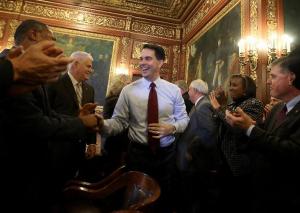The U.S. Federal Communications Commission plans to vote on new net neutrality rules during its February meeting.
FCC Chairman Tom Wheeler will bring a proposal to a vote during the commission’s Feb. 26 meeting, FCC spokeswoman Kim Hart said Friday, following a report in the Washington Post.
It’s unclear, however, what form those rules will take. Hart declined to comment further on the net neutrality order Wheeler plans to circulate in February.
Many telecom policy experts had expected the FCC to take action on net neutrality early this year after a year-long fight over the issue.
Nearly a year ago, a U.S. appeals court threw out a large portion of net neutrality rules the FCC approved in late 2010. The court ruled that the FCC’s rules came too close to common carrier regulations when the commission didn’t take the step of reclassifying broadband providers as regulated utilities. The court, however, pointed to a couple if sections of the Telecommunications Act that the FCC could use to pass net neutrality regulations.
After launching a net neutrality proceeding in early 2014, the FCC has received nearly 4 million public comments about proposed regulations. Wheeler originally proposed that the FCC adopt rules that would allow broadband providers to engage in “commercially reasonable” traffic management, and in limited cases, charge Web content providers and services for prioritized traffic.
But many people filing comments, and groups like Free Press and Public Knowledge, called on the FCC to pass stronger rules prohibiting traffic prioritization deals. Many advocates of strong net neutrality rules want the FCC to reclassify broadband as a regulated public utility, while exempting them from some common carrier rules, like price regulation.
Recent news reports have suggested Wheeler is leaning toward so-called hybrid net neutrality rules that would classify a part of broadband service as a regulated public utility.
The hybrid approach would divide broadband into two services for the purpose of regulation. One service would be retail broadband access, which would remain lightly regulated, and the second would be back-end transit service, which the FCC would reclassify as a regulated common carrier, similar to utility-style regulation for traditional telephone service.
In November, however, President Barack Obama called on the FCC to reclassify all broadband service as a regulated utility.
FCC to vote on net neutrality rules in February | PCWorld#tk.nl_today#tk.nl_today#tk.nl_today
